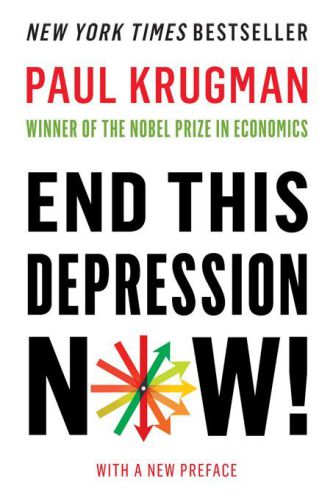
End This Depression Now!
کتاب های مرتبط
- اطلاعات
- نقد و بررسی
- دیدگاه کاربران
نقد و بررسی

Starred review from April 23, 2012
Krugman (Fuzzy Math), winner of the 2008 Nobel Prize in Economics, takes an edifying and often humorous journalistic approach to the current economic crisis in this accessible and timely study. Rather than provide a mere postmortem on the 2008 collapse (though relevant history lessons are provided), Krugman aims to plot a path out of this depression. He maintains that "We are suffering from a severe overall lack of demand;" as every purchase is also a sale, everyone's income is someone's spending , and few are currently spending. This "paradox of thrift," when everyone cuts back and tries to pay off old debt at the same time, ensures a stagnant economyâwhen no new debt is issued, the cycle continues, for one man's debt is another man's asset. Krugman suggests, then, that "the government spend where the private sector won't," Ã la FDR's workers' programs during the Great Depression. The problem, of course, arises when politics enters the equationâsome view government intervention as a gateway to socialism, whereas others can't agree on appropriate "shovel-ready" projects to spend money on. Krugman has consistently called for more liberal economic policies, but his wit and bipartisanship ensure that this book will appeal to a broad swath of readersâfrom the Left to the Right, from the 99% to the 1%. Illus.

April 15, 2012
Krugman (Economics/Princeton Univ.; The Return of Depression Economics and the Crisis of 2008, 2008, etc.) delivers an urgent message on ending the economic crisis. Despite apparent financial stabilization and indications of improvement, writes the Nobel laureate, the conditions of peoples' lives have not changed. "You can't have prosperity without a functioning financial system," he writes, "but stabilizing the financial system doesn't necessarily yield prosperity." The country needs strong leadership to build support for stimulus policies--e.g., large-scale job creation, debt relief and the reversal of current austerities--on a more expansive scale, rather than just accepting compromises. The author takes issue with three main objections: that government spending programs don't work, that increasing deficits undermine business confidence and that there aren't enough quality projects in which to invest. Given that the private sector is not investing enough to provide the needed increase in demand, government spending must be a significant part of the solution. Krugman also examines how the economic profession has lost its way over the last 30 years. For him, the current problems were effectively addressed during the 1930s by Keynes and others; the author doesn't have much patience with opponents or critics, considering them as representing political or ideological, not economic, views. He references ongoing research by a new generation of economists into how government intervention worked to end depressions in the past. An important contribution to the current study of economics and a reason for hope that effective solutions will be implemented again.
COPYRIGHT(2012) Kirkus Reviews, ALL RIGHTS RESERVED.

























دیدگاه کاربران